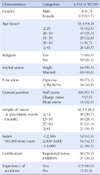Abstract
Purpose
The purpose of this study was to examine the mediator role of psychological empowerment in the relationship between professional self-concept and burnout in psychiatric nurses.
Methods
A cross-sectional correlational survey was conducted in S city and G province with 127 psychiatric nurses working in mental hospitals. Data were collected from March 8 to 16, 2012. The instruments used were the Psychological Empowerment Questionnaire, the Professional Self-concept of Nurses Instrument, and the Tedium Measurement. The collected data were analyzed using t-test, ANOVA, Pearson correlation coefficients and multiple regression with PASW 20.0.
Results
Statistically significant relationships were found among professional self-concept, psychological empowerment, and burnout. Psychological empowerment functioned as a mediator between professional self-concept and burnout.
Conclusion
The implication of the results is that interventions that focus on psychological empowerment will contribute to the reduction of burnout in psychiatric nurses. This study also contributes to knowledge about the conditions that precede burnout, and shows the important role of psychological empowerment in the relationship between professional self-concept and burnout.
Figures and Tables
Table 3
Professional Self-concept, Psychological Empowerment, and Burnout according to General Characteristics (N=127)

References
1. Ahmad N, Oranye NO. Empowerment, job satisfaction and organizational commitment: A comparative analysis of nurses working in Malaysia and England. Journal of Nursing Management. 2010. 18:582–591.
2. Arthur D. Measuring the professional self-concept of nurses. 1990. Australia: University of Newcastle;Unpublished master's thesis.
3. Baron RM, Kenny DA. The moderator-mediator variable distinction in social psychological research: Conceptual, strategic, and statistical considerations. Journal of Personality and Social Psychology. 1986. 51:1173–1182.
4. Boudrias JS, Morin A, Brodeur MM. Role of psychological empowerment in the reduction of burnout in Canadian healthcare workers. Nursing and Health Sciences. 2012. 14:8–17.
5. Breland NK. Mental health nurses' perceptions of empowerment and job satisfaction. 2007. Winnipeg, Canada: University of Manitoba;Unpublished master's thesis.

6. Casey M, Saunders J, O'hara T. Impact of critical social empowerment on psychological empowerment and job satisfaction in nursing and midwifery settings. Journal of Nursing Management. 2010. 18:24–34.

7. Cho EJ. Relationship between professional self-concept and burnout of nurses in geriatric hospital. 2007. Busan: Kosin University;Unpublished master's thesis.
8. Halbesleben JR, Wakefield BJ, Wakefield DS, Cooper LB. Nurse burnout and patient safety outcomes. Western Journal of Nursing Research. 2008. 30:560–577.
9. Hanrahan NP, Aiken LH, McClaine L, Hanlon AL. Relationship between psychiatric nurse work environments and nurse burnout in acute care general hospitals. Issues in Mental Health Nursing. 2010. 31:198–207.

10. Hochwälder J. The work environment and burnout among swedish registered and assistant nurses: The main, mediating, and moderating role of empowerment. Nursing and Health Sciences. 2007. 9:205–211.

11. Hong KP. A analysis of the burnout of registered nurses. 1984. Seoul: Yonsei University;Unpublished master's thesis.
12. Jang HJ, Yang SO, Lee MO. Professional selfconcept and self-efficacy according to the need for advanced practice nurse among Korean nurses. Journal of Korean Academy of Fundamental Nursing. 2007. 14:110–119.
13. Jin JS, Lee JS, Lee SY, Moon SJ, Baek JW. Development of evaluation indicator and system for psychiatric hospital. 2010. Seoul: Seoul National University Management Center for Health Promotion.
14. Jung SM, Lee KO. Relationship between the professional self-concept and role performance of the psychiatric mental health nurse practitioners. Journal of Korean Academy of Psychiatric and Mental Health Nursing. 2003. 12:402–414.
15. Kim JS, Kim GS, Choi MN, Lee HK. Factors associated with burnout for nurses working in hematology-oncology wards. Korean Journal of Occupational Health Nursing. 2011. 20:24–34.
16. Kim MH. The moderator-mediator role of empowerment in the community welfare center. 2004. Seoul: Ewha Womans University;Unpublished master's thesis.
17. Kim MS, Park YB. The effects of self-efficacy and empowerment on perceived organizational support and organizational citizenship behaviors of nurses. Journal of Korean Academy of Nursing Administration. 2008. 14:268–277.
18. Knol J, Linge RV. Innovative behaviour: The effect of structural and psychological empowerment on nurses. Journal of Advanced Nursing. 2009. 65:359–370.
19. Lee SY. The influence of job characteristics and professionalism on empowerment perceived by nurses. Journal of Korean Academy of Nursing Administration. 2006. 12:587–596.
20. Lee YM, Kim BM. The mediator effect of empowerment in relationship between transformational leadership and organizational commitment. Journal of Korean Academy of Nursing Education. 2008. 38:603–611.
21. Onyishi IE, Ugwu FO, Ogbonne IP. Empowering employees for change oriented behaviours: The contribution of psychological empowerment to taking charge at work. European Journal of Social Sciences. 2012. 27:301–308.

22. Park HS, Bae YS, Joung SY. A study on anger expression and burnout of psychiatric mental health nurses. Journal of Korean Academy of Psychiatric and Mental Health Nursing. 2003. 12:235–244.

23. Park JU. The relationship between job stress and burnout of psychiatric nurses. 2007. Seoul: Ewha Womans University;Unpublished master's thesis.

24. Park MS, Yang S, Yu SJ. Professional self concept of psychiatric mental health nurse practitioner and general nurse in psychiatric ward. Journal of Korea Community Health Nursing Academic Society. 2002. 16:95–104.

25. Pines AM, Aronson E, Kafry D. Burnout from tedium to personal growth. 1981. New York: A Division of Macmillan Publishing Co., Inc.

26. Pines AM, Keinam G. Stress and burnout: The significant difference. Personality and Individual Differences. 2005. 39:625–635.

27. Song CH, Noh CH. An analytical study of the professional self-concept of hospital nurses in Korea. Journal of Korean Academy of Nursing. 1996. 26:94–106.

28. Spreitzer GM. An empirical test of a comprehensive model of intrapersonal empowerment in the work place. American Journal of Community Psychology. 1995. 23:601–629.

29. Sun N, Li QJ, Lv DM, Lin P, Lu GZ, An XM. The psychometric properties of the Chinese version of the problem areas in psychological empowerment scale (PES): Scale development. Journal of Clinical Nursing. 2011. 20:369–376.
30. Sung MH, Yoon HO, Lee HJ. A study on relationship between job stress, burnout experience and job satisfaction of nurses. Korean Journal of Occupational Health Nursing. 2007. 16:147–157.




 PDF
PDF ePub
ePub Citation
Citation Print
Print






 XML Download
XML Download